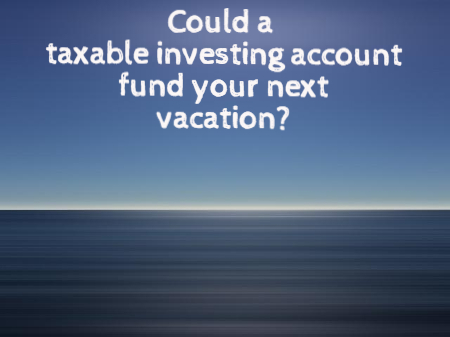It's not often that we think of investing for short-term goals like a travel fund. Too often, that money sits in a cash account, earning meager interest.
Back in 2015, I was able to make a fresh start with my life. As part of my overhaul, I also changed things up with my finances and created a travel fund.
I've long advocated the creation of a “fun fund,” and I use a taxable investment account for my fun fund. But I decided to create another fund specifically aimed at travel. Because travel is one of my true pleasures, I wanted to make it a priority.
As is my regular procedure when investing for short-term goals (and long-term goals), I use an indexing strategy.
My Travel Fund
I decided to use my Betterment account back in the day when it started. Today, it's at M1 Finance. My Roth IRA was already at Betterment, so it was easy to set up another goal and direct some of my money toward that account. Unlike my retirement goal, which has a 90% stock/10% bond split, I am slightly more conservative with the travel fund. My split in this case is 58% stock/42% bonds.
When investing for short-term goals, whether you invest with Betterment or use some other broker, it's important to balance the desire to see good returns with the risk that you could lose some of the money. Because bonds are considered safer, boosting my allocation in that area seemed the thing to do. (Of course, an argument could be made that I should allocate more to bonds.) So far I don't regret my decision, though. I've earned almost $20 since setting the goal in August, and as I move forward, my travel fund will continue to grow and result in more earnings that I can use to plan awesome trips with my son.
Indexing to Reduce Some of the Risk
One of the reasons many consumers are shy of investing for short-term goals is the volatile nature of stocks and concerns about stock picking. This is one of the reasons that I love indexing. There is no need to pick stocks when you index. Instead, you have exposure to a wider segment of the market. Rather than worrying about whether one security does well, you can take advantage of the entire market's performance.
Anyone who listens to me talk about beginning investing—or any investing—knows that I'm a hardcore indexer. Even with my short-term goals, I prefer indexing. A robo-advisor or some other approach can help you take care of that, including using index ETFs designed to help you reach your goals.
In general, indexing is low-cost. I look for brokers that don't charge transaction fees. Instead, a relatively low annual fee is charged based on my assets. I automatically transfer the same amount into my travel fund each month.
Indexing reduces some of the risk associated with stock investing, and investing in dividend index ETFs can add another layer of returns with somewhat limited risk.
Usually, I pay for the costs with a credit card and then liquidate investments to pay off the balance. Get those points!
(If you want a step-by-step guide to setting up your travel fund, consider my mini-course on building a travel fund.)

Watch Out for the Risks of Investing Your Travel Fund
Of course, indexing won't eliminate the risk. You still have to be aware of the possibility of loss. Any investment comes with that risk. (And keeping your money in a cash account comes with the risk of inflation loss.)
The key to investing for short-term goals is understanding what you can handle and planning to deal with it. I know that even if the market is down today, there is a good chance that it will rise over time. Plus, with the dividends involved, I'll probably come out ahead, barring some huge crash just before I decide I want to liquidate my assets and pay for a sweet trip.
Another consideration is what happens if you do lose out. I also keep the bulk of my emergency fund in a taxable investment account. I use the “first in first out” method when selling shares so that most of what I sell counts as long-term capital gains.
The other possibility is that I sometimes wind up with losses when I sell. In those instances, my loss is transformed into a tax deduction. Even if I end up with a loss overall, I'll probably still have sufficient capital in my account to reach my goals. And I've made my vacation tax-deductible. If I sell and end up with gains, most will be long-term capital gains, taxed at a favorable rate.
Here are some of the ways I've used my travel fund over the last few years:
- Viking River Cruise with my son
- Christmas cruise with my cousin
- Epic two-week road trip with a good friend
- Trip to China
- Trip to Hawaii
I don't always use my travel fund. I have other money available to me, especially for smaller trips. My business trips are often covered by my business account or reimbursed because I speak at an event.
There are always risks, but if you want a better chance of building your travel fund and can stomach it, a taxable account can make sense when investing for short-term goals.



